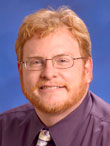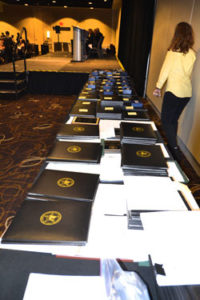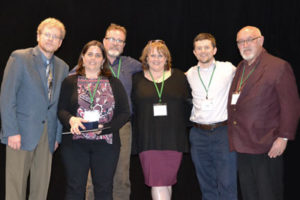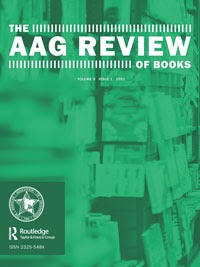The Difference That an Award Can Make (For All of Us)

One of the greatest pleasures of serving as President of the AAG is attending and participating in the Association’s awards ceremonies, both at Regional Division conferences and at the Honors Luncheon held every year at our national meetings. Words cannot adequately describe the feelings of pride and fulfillment that award recipients appear to experience upon having their scholarship, teaching, or outreach/service recognized publicly.
The AAG sponsors a number of important awards. The number and type of awards, for both individual professionals and even whole academic programs, have steadily grown over the years. While we have no shortage of accomplished geographers to honor and nominees for awards are consistently of high quality, we arguably don’t receive enough nominations for all awards. And in some instances, awards are not given every year because of a lack of submissions. This difficulty in garnering award nominations is not restricted to the Association but appears to be a challenge at a variety of institutional levels, including at many colleges and universities.

As I write, the Association is calling for nominations for many of its major honors, including its newly created AAG Fellows Program. I count no less than 40 separate AAG Awards, exclusive of those given by specialty and affinity groups. Some awards have a nomination deadline of June 30 and others having a deadline of December 31. I encourage members to take full advantage of the award nomination process to recognize deserving colleagues. Members might also consider nominating a person previously overlooked or unsung at awards ceremonies but who has given significantly to geography. I suggest in this column that awards make a difference to us, both in terms of the welfare of individual nominee and the wider discipline.
The visibility and recognition that comes with honoring others can have a major impact on their lives, careers, and sense of belonging. The time and energy invested in creating a nomination, which admittedly can be significant, is about lending aid to colleagues and making an intervention in “managing the egosystems” that operate within the Academy. The term “egosystem,” a play on the word “ecosystem,” recognizes that departments and other workplaces are, at their heart, communities of scholars whose self-conceptions and interconnected relations with each other shape the overall health and working environment of the team. These egosystems—if out of balance—can lead to deserving colleagues being ignored and feeling de-valued and under-appreciated, which in turn affects their morale and material well-being. As I noted in my first presidential column, one’s career, although it can feel like a lonely, solitary pursuit, is constantly defined by social relationships with others. The decision to nominate someone is about taking some responsibility for that person’s professional and personal success.
Enhancing our participation in award nominations is also critical to the social project of promoting geography to external audiences and demonstrating excellence in a time of growing academic assessment and accountability. Nominating is decidedly about pushing past one’s self interest and advocating for someone else, which can be difficult in a profession that at times pits us against each other. In the end, however, nominating a colleague for an award is more than a possible victory for that particular person; it is a potential win for all of us as we work to enhance the public image and prominence of the wider discipline. Importantly, a vibrant and advocacy-centered culture of award nomination must also recognize the many different ways and institutional settings in which geographers work and make contributions. I discuss this latter point in the context of a recent Council decision to expand the AAG Program Excellence Award to recognize geographers working in two-year/community colleges.
Managing the Egosystem
Over the past few years, I have increasingly used the phrase “managing egosystems” to capture the difficult but important responsibility that we have in ensuring a healthy and sustainable balance of social relations within our departments, programs, and other workplaces. It will surprise no one when I say that the Academy is composed of strong egos, personalities, and agendas. Arguably, these egos are necessary for competing and having an impact within the marketplace of ideas. But too much ego or self-importance can negatively affect working conditions, create low levels of self-esteem among some colleagues, and even result in the marginalization of other voices and contributions within geography. The very structure and composition of awards can reflect and reinforce an out of balance egosystem. For example, the array of awards within AAG has only a few honors explicitly for non-tenure track scholar-teachers, even though fixed term lecturers, adjuncts, and faculty and staff of practice have a growing presence in universities.
I believe that an expanded and inclusive approach to award nomination can be an effective mechanism in addressing egosystems characterized by inequalities. While everyone likes recognition, it has special meaning in the rigorous Academy, which can sometimes be a tough place for maintaining one’s confidence and sense of value. As a Department Head for five years, I frequently saw what self-doubt could do to brilliant people and how a broad, proactive approach to award nomination can lift the morale of faculty members, staff, and students—especially those from historically under-represented groups or those lacking the following, volume and promotional savvy of other colleagues. Effective department leaders—a term not confined only to those holding formal administrative duties—nominate frequently and encourage those around them to do the same. In some universities, progressive leaders have established entire committees to oversee and assist with the preparation of nominations for their departments and programs.
Importantly, the difference that an award can make is not restricted to the socio-psychological well-being of the person nominated. Rather, awards have material, career-value for many of us positioning for an employment opportunity, merit raises, tenure and promotion, and consideration for other forms of professional advancement. Receiving an AAG award can significantly enhance a colleague’s professional standing back at their home institution and can be leveraged in making nominations for other honors, on and off campus. In this respect, a lack of nominations for a particular award potentially represents a lost opportunity to increase the security and even survivability of colleagues within their jobs and programs of study. Award nominations can be one of many mechanisms used to advance the goal of broadening participation in geography and creating a disciplinary “ethics of care” that can recruit and retain talented colleagues.
Awards as Disciplinary Advocacy
And while awards are important to one’s personal sense of belonging and self-worth, I also argue that the nomination process is inherently a practice in disciplinary advocacy, a means of ensuring that the achievements of geographers are recognized by wider audiences—some of whom may or may not fully understand what geography is and what geographers contribute.
As a Department Head, I always loved seeing one of my faculty, staff, or students receive an award. First and foremost, I felt great for the person being honored, especially since I had observed first-hand the amount of work and sacrifice that person invested in her work. Second, the award became a bragging point for me as I went to my College Dean or University Provost in making the case for why geography deserved more resources, a greater place in the curriculum, or simply a greater amount of public attention. Indeed, news about winning awards should always be included in distributed press releases, alumni newsletters, social media promotions, and student recruitment brochures. Third, for my university and many others, awards have become—for better or for worse—part of the analytics used to assess the productivity of programs and their standing among other units on campus as well as within national rankings. In this respect, not actively participating in the award nomination process can have a detrimental effect on one’s own program and ultimately how geography is rated overall among other fields.

It was this very recognition that awards have a larger institutional context and cache that motivated the Association’s Council to approve four years ago the creation of a Program Excellence Award for non-PhD granting geography departments. The award acknowledges the collective efforts of professors, lecturers, staff, and students in enhancing the prominence of Geography as a discipline. It is believed that bestowing the awards would allow BA/BS and MA/MS geography departments to demonstrate external recognition of program quality to university officials, prospective students and faculty, and the general public. In the current academic environment, evidence of excellent standing or distinction can be important to administrators as they make strategic decisions about departments and programs. Indeed, some past departmental recipients of the AAG Program Excellence Award report that they have been successful in leveraging this discipline-wide recognition into greater institutional consideration and investment.
While the AAG Program Excellence Award has attracted stellar nominations, not all regional divisions are participating (every year, each regional division is permitted two preliminary nominations). Granted, regional division leaders do not have to nominate every year (nor in every program category), but I know that each of our regions overflows with excellent non-doctoral geography departments. I stress this point about the broadening base of nominations since we are in a time when even historically strong programs are under the threat of reduction, merger with other disciplines, or even elimination. Can any of us in today’s university afford not to take advantage of an opportunity to advocate for (and nominate for recognition) the achievements of our discipline and its practitioners?
Taking a proactive approach to nominations will grow in importance with the AAG Program Excellence Award now that it has a separate category for recognizing geography programs/departments at two-year/community colleges. Thanks to a proposal brought by Treasurer Julie Cidell, the Council approved at the New Orleans national meeting this expansion, recognizing that more than 150 two-year colleges in the US offer a degree program in geography. Geography departments at these institutions promote geography in their local communities, support (and mentor) high school teachers teaching college credit courses, provide retraining to students returning to school and support life-long learners. Yet, because faculties at two-year/community colleges often do not belong to AAG and they lack funds for Association dues and travel to conferences, it will be even more imperative that our Regional Divisions reach out to geographers at these institutions, get to know them, and advocate for them through the nomination process. Colleagues at two-year colleges are often poorly resourced, strapped for time, and especially vulnerable to administrative pressures. They are an important front line in the discipline maintaining its health and sustainability.
Don’t Expect Someone Else to Nominate
In closing, many of us labor under a dangerous assumption that someone else will nominate outstanding people. Some of us even believe that honors/awards selection committees will no doubt solicit nominations for qualified individuals. Even if the latter assumption were a valid one, it is realized unevenly. Some awards committees are actually quite passive in their approach, seeing themselves as merely the receivers and evaluators of nominations rather than the cultivators of dossiers. Moreover, committee-solicited nominations rely upon traditional networks of familiarity and run the risk of missing someone operating in different professional, social, and intellectual circles. Bottom line, if you think someone is deserving of an honor, then move forward decisively to work (by yourself or better yet, with others) to nominate that person.
I am interested in knowing from AAG members about their experiences in the area of nominations and awards—whether as a member of an award selection committee, a nominator for someone, or the recipient of a nomination. What difference do you feel that awards make in our careers and discipline and how can we enhance that impact even more. What obstacles, either internal or external to the nomination process at AAG, limit people’s involvement in this important part of our professional culture? Please share your thoughts and experiences by emailing me (dalderma [at] utk [dot] edu) or share on Twitter #PresidentAAG.
— Derek Alderman
Professor of Geography, University of Tennessee
President, American Association of Geographers
Twitter: @MLKStreet
DOI: 10.14433/2017.0034

